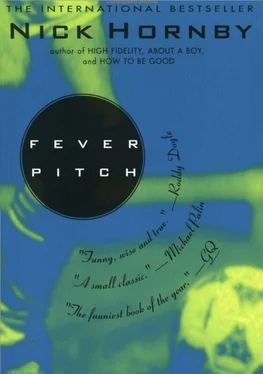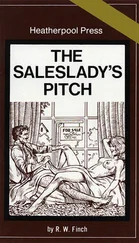I suspect that I moved here a good twenty years too late, and that for the last couple of decades the local support has dwindled away steadily. According to the club’s information, a huge percentage of fans live in the Home Counties (when I travelled down from Cambridge, the trains were packed with Arsenal supporters by the time we got to Hatfield). Football in London—at Spurs, Chelsea, Highbury and, to a lesser extent, West Ham—has become a suburban afternoon out. The demographics have changed now, and all those people who used to walk to the game from Islington and Finsbury Park and Stoke Newington have gone: they’re either dead or they’ve sold up, moved out to Essex or Hertfordshire or Middlesex. And though you see a fair few people walking around with club shirts on, and some of the shopkeepers take an interest in the results (one of the guys who runs the news-stand inside the station is a committed and knowledgeable fan, although his brother supports Chelsea), I’m more alone here than I ever thought I would be at the end of the sixties, all those years ago, when I used to pester my dad to buy a house on Avenell Road, and he said I’d get fed up with it.
ARSENAL v CHARLTON
21.3.89
I’m writing about me, now. The boy who fretted his way through the first part of this book has gone; the young man who spent most of his twenties twisted in on himself isn’t around either. I can no longer use age, or rather youth, to explain myself in the way I have been able to do elsewhere.
As I get older, the tyranny that football exerts over my life, and therefore over the lives of people around me, is less reasonable and less attractive. Family and friends know, after long years of wearying experience, that the fixture list always has the last word in any arrangement; they understand, or at least accept, that christenings or weddings or any gatherings, which in other families would take unquestioned precedence, can only be plotted after consultation. So football is regarded as a given disability that has to be worked around. If I were wheelchair-bound, nobody close to me would organise anything in a top-floor flat, so why would they plan anything for a winter Saturday afternoon?
Like everyone, I have a peripheral role to play in the lives of most of the people I know, however, and these people are often uninterested in the forthcoming First Division programme. So there have been wedding invitations that I have reluctantly but unavoidably had to turn down, although I am always careful to provide a socially acceptable excuse involving family problems or work difficulties; “Home to Sheffield United” is deemed an inadequate explanation in situations like these.
And then there are the unpredictable Cup replays, the rearranged midweek fixtures, the games transferred from Saturday to Sunday at short notice in order to accommodate the television schedules, so I have to refuse invitations that clash with potential fixtures, as well as those which clash with actual fixtures. (Or I do arrange something, but warn the parties involved that I might have to pull out at the last moment, which sometimes doesn’t go down too well.)
But it gets harder and harder, and sometimes hurting someone is unavoidable. The Charlton game was rearranged for the same night as a very close friend’s birthday party, a party to which only five people had been invited. Once I realised that there was a conflict of interest, there was the usual brief panic as I contemplated a home game taking place without me; and then I phoned her with a heavy heart and told her what had happened. I was hoping for a laugh and absolution, but I got neither, and from the sound of her voice, from the disappointment and tired impatience it contained, I understood that I wasn’t going to. Instead, she said one of those awful things, “You must do what you think is right”, or “You must do what you want to do”, something like that; one of those chilling deliverances designed to find you out, and I said that I’d have to think about it, but we both knew that I wasn’t going to think about it at all, that I had been exposed as the worthless, shallow worm I was, and I went to the game. I was glad I went, too. Paul Davis scored one of the best goals I have ever seen at Highbury, a diving header after he’d sprinted the length of the pitch following a Charlton attack.
There are two points that arise from incidents like this. Firstly, I have begun to suspect that my relationship is with Highbury, rather than with the team: if the match had taken place at the Valley or Selhurst Park or Upton Park, none of them inaccessible, you might have thought, to a man as obsessive as this one, then I wouldn’t have gone. So what’s this all about? Why am I hell-bent on seeing a match involving Arsenal in one part of London, but not another? What, in the jargon of the therapist, is the fantasy here? What do I imagine would happen to me if I didn’t go to Highbury just for one evening, and missed a game that might have been crucial to the eventual outcome of the Championship race but hardly promised unmissable entertainment? The answer, I think, is this: I am frightened that in the next game, the one after the one I have missed, I won’t understand something that’s going on, a chant or the crowd’s antipathy to one of the players; and so the place I know best in the world, the one spot outside my own home where I feel I belong absolutely and unquestionably, will have become alien to me. I missed the game against Coventry in 1991, and the game against Charlton in 1989, but I was abroad at the time. And though the first of those absences felt odd, the fact that I was several hundred miles from the stadium assuaged the panic and made it tolerable; the only time I have ever been somewhere else in London while Arsenal were at home (I was at Victoria, queuing for a ticket on Freddie Laker’s Skytrain, while we were beating QPR 5-1 in September 1978, and my recall of both score and opponents signifies something), I felt squirmingly uncomfortable.
But one day, soon, it’s going to have to happen again, I know that. Illness (but I’ve been to Highbury with flu and sprained ankles and more or less anything that didn’t require access to a toilet), a future child’s first football match or school play (surely I’d go to the school play … but I fear that I’m daft enough to pass it over and thus ensure that the child spends hours on some Hampstead couch in the year 2025 explaining to a disbelieving shrink that throughout his or her childhood I always put Arsenal first), family bereavement, work …
Which brings me to the second point arising from these rearranged game problems: work. My brother now has a job which demands more than a nine-to-five routine, and though I can’t recall him missing a game through work hitherto, it is only a matter of time. One day soon, this season or next, someone will call an impromptu meeting that won’t end until half past eight or nine o’clock, and he will be sitting staring at a memo while three or four miles away the Merse is humiliating an opposing full-back. And he won’t like it, but he won’t have much choice, so he’ll shrug and get on with it.
I don’t think I could do that kind of job, for the reasons outlined above. But if I did, I hope I’d be able to shrug. I hope I wouldn’t kick out, in my panic, and pout, and plead, and generally reveal myself as someone who has yet to come to terms with the demands of adult life. Writers are luckier than most, but one day, I suppose, I will have to do something at a time disastrously inconvenient to me—I’ll have a one-off chance to interview somebody who can only fit me in on a Saturday afternoon, or there will be some impossible deadline which requires a Wednesday evening in front of the word-processor. Proper writers go on author tours, and appear as guests on Wogan , and all sorts of things fraught with perils, so maybe one day there will be all that to contend with. Not yet, though. The publishers of this book cannot reasonably expect me to write about this kind of neurosis and then ask me to miss a few games to help them publicise it. “I’m mad, remember?” I will tell them. “That’s what this whole thing is about! No way can I do a reading in Waterstone’s on a Wednesday night!” And so I survive a little longer.
Читать дальше











